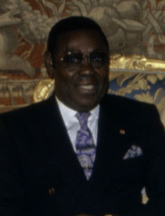André Kolingba facts for kids
Quick facts for kids
André-Dieudonné Kolingba
|
|
|---|---|
 |
|
| 4th President of the Central African Republic |
|
| In office 1 September 1981 – 22 October 1993 |
|
| Prime Minister |
|
| Preceded by | David Dacko |
| Succeeded by | Ange-Félix Patassé |
| Personal details | |
| Born | 12 August 1936 Bangui, Ubangi-Shari |
| Died | 7 February 2010 (aged 73) Paris, France |
| Political party | RDC |
| Signature |  |
André-Dieudonné Kolingba (born August 12, 1936 – died February 7, 2010) was a leader from the Central African Republic. He served as the fourth President of the Central African Republic (CAR). He was president from September 1, 1981, to October 1, 1993.
Kolingba took power from President David Dacko in 1981. This happened in a coup d'état, which means he took control of the government suddenly, without fighting. He later lost power to Ange-Félix Patassé in an election held in 1993.
France strongly supported Kolingba until 1992. After the Cold War ended, he faced pressure to hold democratic elections. He lost these elections. During his time as president, international groups like the International Monetary Fund (IMF) and World Bank had a bigger say. These groups help countries with money. Many people from Kolingba's own group, the Yakoma people, got important jobs. This caused tension between different groups in the country.
Contents
Biography
Early life and military career
André-Dieudonné Kolingba was born on August 12, 1936. His birthplace was Bangui, the capital of a French colony called Oubangui-Chari. This area is now the Central African Republic. He was part of the Yakoma people.
In 1954, Kolingba joined the French military. When the Central African Republic became independent in 1960, he joined its army. He rose through the ranks, becoming a sub-lieutenant in 1964. By 1973, he was a brigadier general. He also worked as an adviser and aide to the leader at the time, Bokassa. Later, he served as an ambassador to Canada and Germany. In 1979, he became a minister. In 1981, he was made army chief of staff.
Taking power from David Dacko
In September 1981, General Kolingba took control from President Dacko. This event is known as the 1981 Central African Republic coup d'état. Some people believe French military advisers helped him. However, it's thought that the French President at the time, François Mitterrand, did not know about it. France continued to support Kolingba. But by the late 1980s, things changed. Many African countries started moving towards democracy. This led to calls for elections in the Central African Republic.
Years in power
After taking over in 1981, Kolingba set up a military committee. He ruled the country as a military leader. In 1986, he held a vote on a new constitution. This constitution made him president for six years. It also made his party, the Central African Democratic Rally (RDC), the only legal party. In 1987, elections were held, but voters could only choose from a list of RDC candidates. This meant Kolingba had full control.
By 1992, the Cold War had ended. Western countries were less willing to support leaders who were not democratic. Kolingba faced pressure to allow more freedom. In 1991, he agreed to share power with Edouard Frank, who became prime minister. He also started a group to make the constitution more democratic. International groups, especially the US ambassador, pushed Kolingba to hold free elections. These elections happened in 1992. Kolingba finished last, with only 10% of the votes. He then said the election was not valid. His term was supposed to end in November 1992. But he extended his time as president for another 90 days.
Election of Patassé
On February 3, 1993, Kolingba created a temporary council. On February 28, 1993, an opposition leader said Kolingba was no longer president. Kolingba tried to stay in power. But international groups, including those from the USA and France, made him hold proper elections. The same team that helped with the earlier election came back to assist. Kolingba came in fourth place, with only 12% of the votes.
Ange-Félix Patassé won the presidency in the second round on September 19, 1993. Kolingba handed over power to Patassé a month later. This was a very important moment. It was the first time since the country became independent that a president peacefully gave up power to an opponent.
Later life and attempted coup
On May 28, 2001, there was an attempt to overthrow President Patassé. This attempt failed. Patassé accused Kolingba of being involved. Kolingba then went to Uganda for safety. Patassé himself was later overthrown in 2003 by François Bozizé. Bozizé announced that he would forgive everyone involved in the 2001 coup attempt.
Kolingba returned to Bangui on October 5, 2003. He attended a meeting about peace and rebuilding the country. On October 7, 2003, Kolingba spoke at the meeting. He publicly asked for forgiveness for any mistakes made during his time as president. He then traveled to Paris for surgery. Kolingba died in Paris on February 7, 2010.
Awards and family
Kolingba received several honors during his life. These included awards like the Officer of the Order of the Operation Bokassa and the Grand Cross of the Central African Order of Merit.
| Political offices | ||
|---|---|---|
| Preceded by David Dacko |
President of Central African Republic 1981–1993 |
Succeeded by Ange-Félix Patassé |
See also
 In Spanish: André Kolingba para niños
In Spanish: André Kolingba para niños

